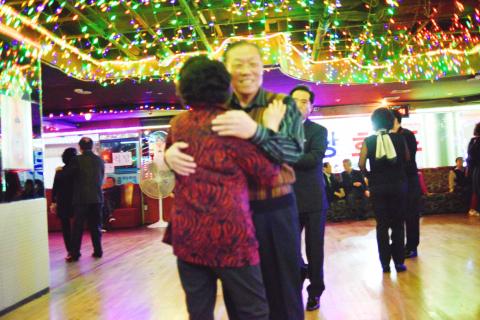As the mercury outside plunges to minus-10°C on an ice-cold afternoon, the dance floor inside the Kukilgwan Palace is packed with gray-haired Korean couples moving to the rhythms of high-volume disco.
“I come here every day of the week, except for Saturday and Sunday,” said 81-year-old Jun Il-taek as he danced beneath the giant disco balls and brightly colored string lights decorating the venue in central Seoul.
Jun was one of about 200 men and women on the floor — all engaged in the same, rather static, knee-bobbing dance routine, with the odd slow-motion twirl to liven things up.

Photo: AFP
The sedate nature of the dancing is in stark contrast to the decibel level of the music, which slowly envelops the ascending elevator as it approaches the ninth-floor dance club.
“Nothing keeps me healthier than dancing ... I can’t live without this place,” Jun said, deftly leading his 75-year-old female partner into a slow turn.
The army veteran is one of thousands of retired South Koreans hitting the dance floors at “Colatecs” — special discos for the elderly that are flourishing across the nation.
South Korea’s rapidly aging population might be a major headache for policymakers, but its members are determined to enjoy themselves, dancing the years away at clubs where 50-year-olds are turned away for being “too young.”
Colatecs first emerged in the late 1990s as dance halls for teenagers, where alcohol was banned and the only drinks on offer were sodas.
However, they soon fell out of fashion with their young clientele which migrated to gatherings at Internet cafes and karaoke clubs.
And so the Colatecs rebranded themselves for an entirely different demographic.
“They became a playground for the over-60s ... and they turned out to be far more loyal customers,” said Lee Kwan-woo, the owner of the Kukilgwan Palace which was established in the early 2000s.
“Here, they can exercise to stay healthy, make new friends and have a little bit of excitement,” said the 70-year-old former nightclub singer.
South Koreans aged 65-plus make up 13 percent of the population, that figure is expected to rise to as much as 40 percent by 2060.
Currently, half of that demographic live on or below the poverty line. A meager pension and lack of social welfare make retirement a daunting prospect.
Among those with some disposable income, leisure activity is something of an unknown field for a generation whose labor transformed the nation from a war-ravaged backwater to Asia’s fourth-largest economy.
The entrance fee is 1,000 won (US$0.83). Most of the club’s income comes from food and drinks.
The physical limitations of its elderly patrons are reflected in the 12pm to 6pm opening hours which, Lee says, work well because most “feel too tired at night.”
A well-stocked medicine cabinet contains remedies for a host of possible emergencies, including a sudden drop in sugar levels.
Many patrons are widows or widowers looking for some company and mild flirtation, and anyone under 60 is turned away as they might “annoy other patrons and spoil the mood,” Lee said.

Packed crowds in India celebrating their cricket team’s victory ended in a deadly stampede on Wednesday, with 11 mainly young fans crushed to death, the local state’s chief minister said. Joyous cricket fans had come out to celebrate and welcome home their heroes, Royal Challengers Bengaluru, after they beat Punjab Kings in a roller-coaster Indian Premier League (IPL) cricket final on Tuesday night. However, the euphoria of the vast crowds in the southern tech city of Bengaluru ended in disaster, with Indian Prime Minister Narendra calling it “absolutely heartrending.” Karnataka Chief Minister Siddaramaiah said most of the deceased are young, with 11 dead

By 2027, Denmark would relocate its foreign convicts to a prison in Kosovo under a 200-million-euro (US$228.6 million) agreement that has raised concerns among non-governmental organizations (NGOs) and residents, but which could serve as a model for the rest of the EU. The agreement, reached in 2022 and ratified by Kosovar lawmakers last year, provides for the reception of up to 300 foreign prisoners sentenced in Denmark. They must not have been convicted of terrorism or war crimes, or have a mental condition or terminal disease. Once their sentence is completed in Kosovan, they would be deported to their home country. In

DENIAL: Musk said that the ‘New York Times was lying their ass off,’ after it reported he used so much drugs that he developed bladder problems Elon Musk on Saturday denied a report that he used ketamine and other drugs extensively last year on the US presidential campaign trail. The New York Times on Friday reported that the billionaire adviser to US President Donald Trump used so much ketamine, a powerful anesthetic, that he developed bladder problems. The newspaper said the world’s richest person also took ecstasy and mushrooms, and traveled with a pill box last year, adding that it was not known whether Musk also took drugs while heading the so-called US Department of Government Efficiency (DOGE) after Trump took power in January. In a

LOST CONTACT: The mission carried payloads from Japan, the US and Taiwan’s National Central University, including a deep space radiation probe, ispace said Japanese company ispace said its uncrewed moon lander likely crashed onto the moon’s surface during its lunar touchdown attempt yesterday, marking another failure two years after its unsuccessful inaugural mission. Tokyo-based ispace had hoped to join US firms Intuitive Machines and Firefly Aerospace as companies that have accomplished commercial landings amid a global race for the moon, which includes state-run missions from China and India. A successful mission would have made ispace the first company outside the US to achieve a moon landing. Resilience, ispace’s second lunar lander, could not decelerate fast enough as it approached the moon, and the company has